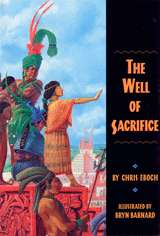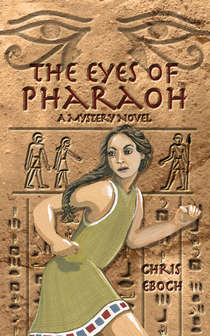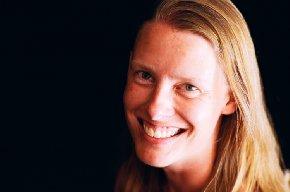Continuing the series about Alternate Publishing. This is part 3 of 8.
- Alternate Publishing: POD to Finish a Series
- Alternate Publishing: Niche Marketing of Nutrition for Kids
Dodging Trends: Why I Turned to Self-Publishing
Guest Post by Chris Eboch
“If a book is good enough, it will find a home.” I’ve heard that a lot in the publishing industry, especially from editors and agents.
There’s just one problem. It’s not true.
After 15 years in this business, 12 traditionally published books, and years as a teacher through the Institute of Children’s Literature, writing organizations, and local colleges, I think I’m a pretty good judge of quality. And yet I’ve seen too many great manuscripts fail to sell. Maybe some authors just need to keep trying, but when multiple published authors say, “I can’t believe her novel hasn’t sold yet,” you have to acknowledge that the publishing business judges by standards other than quality.
That’s not to say you can sell a terrible book. Rather, a manuscript has to be great AND trendy, or at least something editors and marketing departments predict will sell enough copies to make money for the company. When vampires were selling big, publishers released more vampire books.
 I happen to like historical fiction. My first middle grade novel, The Well of Sacrifice (Clarion Books), came out in 1999. It’s an adventure set in ninth-century Mayan Guatemala, and because many schools teach the Maya in fourth grade, it’s still in print and I get a nice royalty check twice a year.
I happen to like historical fiction. My first middle grade novel, The Well of Sacrifice (Clarion Books), came out in 1999. It’s an adventure set in ninth-century Mayan Guatemala, and because many schools teach the Maya in fourth grade, it’s still in print and I get a nice royalty check twice a year.
 A few years ago, I wrote a mystery set in ancient Egypt. The Eyes of Pharaoh is better written than The Well of Sacrifice, since I’ve become a better writer. Yet wherever I sent it, I got one of two responses – “Historical fiction isn’t selling well these days” or “We already have an Egypt book.”
A few years ago, I wrote a mystery set in ancient Egypt. The Eyes of Pharaoh is better written than The Well of Sacrifice, since I’ve become a better writer. Yet wherever I sent it, I got one of two responses – “Historical fiction isn’t selling well these days” or “We already have an Egypt book.”
I do know writers who have sold historical fiction more recently—mainly literary novels set in America in the last 200 years. And a couple of young adult novels have touched on ancient Egypt (well, at least on Cleopatra, who isn’t all that ancient by Egyptian standards). But despite great feedback on my story, despite teachers telling me they wanted the book for their classroom, despite the love many children have for ancient Egypt, I couldn’t sell The Eyes of Pharaoh.
Several years passed. I’ve pulled out other old manuscripts and decided they were… let’s just say, not worth even trying to revise. But I believed in my Egyptian novel.
In the meantime, the publishing industry was changing.
Self-publishing became a viable option, thanks to inexpensive print on demand and the rise of e-books. So why not publish The Eyes of Pharaoh myself? I traded manuscript critiques for professional copyediting and cover art. I learned about formatting. And two months after deciding to self publish, I held the book in my hands.
I haven’t done tons of promotion, but I e-mailed teachers who had previously contacted me because they were using The Well of Sacrifice in the classroom. I posted updates on Facebook and got The Eyes of Pharaoh listed in an e-newsletter about inexpensive e-books. I sold a few books at local events.
Will this make me rich and famous?
Not likely. But I’ve sold over 100 print copies of The Eyes of Pharaoh, which means I’ve bypassed the statistic that most self-published books sell fewer than 100 copies—and my book will never go out of print. Plus, 37 copies sold in the first three weeks of February, including a set of 20 that probably went to a school. At least I’m making a few hundred dollars a year, and people are reading my story. (All my self-published books are available as e-books as well, but The Eyes of Pharaoh has sold much better in print.)
I enjoyed the process enough that I have since released three other “indie” books. Two are romantic suspense under my pen name when writing for adults, Kris Bock. Given the state of the publishing industry (lower advances, rights grabs, less promotion for debut books), I feel that writers of adult genre fiction have better opportunities with self-publishing, so I didn’t even try to sell these traditionally.
My other self-published book is a collection of essays on the craft of writing, called Advanced Plotting. This one was also hard to market traditionally, as there aren’t many traditional publishers who do writing craft books. I can draw on my reputation as a writing teacher and private critiquer, and promote it on my Write Like a Pro! blog, where I post essays on the craft of writing.
I’ve enjoyed the freedom and control that indie publishing provides. That’s not to say this is the right path for everyone. It’s not quick and it’s not easy. If you’re considering this route, you’ll need to learn a lot, be patient, spend time on publicity, and get lucky.
I have a few advantages. I have some reputation as a children’s book author. Hundreds of teachers and thousands of students have already read The Well of Sacrifice. Despite all those publishers who claim they already have an Egypt book, The Eyes of Pharaoh doesn’t have huge competition. Readers looking for a children’s book set in ancient Egypt are likely to find mine pretty quickly. The same wouldn’t be true for a fantasy or contemporary novel.
Not for Newbies
I also don’t recommend self-publishing for new authors, unless you’ve gone through extensive studies and gotten professional feedback that suggests you’re ready for publication. Being successful through self-publishing isn’t a shortcut – it’s at least as hard as being successful through traditional publishing. It’s important to take time and get professional help.
Self-publishing isn’t for everyone. If you can get a good traditional contract, I encourage you to take it. Children’s books are more dependent on school and library sales, and on reviews in industry magazines, and these are much easier to get with traditional publishing. In addition, the e-book revolution has not yet hit children’s books as hard, and you can’t produce such inexpensive books with print on demand.
But things are changing quickly. Some schools are allowing and even encouraging students to bring in e-readers, and in a few years they may be standard in the classroom. We live in a world of expanding publishing opportunities.
Best of all, if you have a book that doesn’t fit market trends, but may still be able to find an enthusiastic (even if small) audience, you can bring the book out yourself. Knowing your work is being read – and dare I say loved? – is the best reward.
Stop by my website to download the “Indie Publishing Worksheet” I developed to help students decide whether or not self-publishing is right for them, and if so, what steps to take.
—
 Chris Eboch’s novels for ages nine and up include The Eyes of Pharaoh, a mystery in ancient Egypt; The Well of Sacrifice, a Mayan adventure; and the Haunted series, which starts with The Ghost on the Stairs. Her book Advanced Plotting helps writers fine-tune their plots. Learn more at www.chriseboch.com or check out her writing tips at her Write Like a Pro! blog.
Chris Eboch’s novels for ages nine and up include The Eyes of Pharaoh, a mystery in ancient Egypt; The Well of Sacrifice, a Mayan adventure; and the Haunted series, which starts with The Ghost on the Stairs. Her book Advanced Plotting helps writers fine-tune their plots. Learn more at www.chriseboch.com or check out her writing tips at her Write Like a Pro! blog.
Chris also writes for adults under the name Kris Bock. Kris Bock writes action-packed romantic suspense involving outdoor adventures and Southwestern landscapes. Rattled follows a treasure hunt in New Mexico and Whispers in the Dark involves intrigue among ancient Southwest ruins. Read excerpts at www.krisbock.com or visit her Amazon page.
Thanks for the free worksheet! Great interview! I always look forward to your discussions about self-publishing. Blessings!
Just an update — I have now sold 51 copies of The Eyes of Pharaoh in February, with additional sales that came in after I wrote this post a week ago.
Thanks for having me, Darcy!
Great post, Chris! :)
Great to see you here, Chris! I am not even going to bother with the Big 6. I figure my collection is going to be so good that a Hollywood this-or-that is going to approach me (that’s what I keep telling myself). And, if not, oh well. Their loss.
Chris is a pro. I have been fortunate to know her as a mentor/teacher at the Institute of Children’s Literature, as an editor for my first novel Silki, the Girl of Many Scarves: SUMMER OF THE ANCIENT, and as a friend. When she speaks…I listen! This is a great post, Chris, and I appreciate your advice that the Indie route is not for newbies. Much is to be said for mastering the craft of novel writing and learning the industry before seeking any kind of publishing route. Self-publishing should never be a license for sloppy turnout.
Thanks for the comments, ladies. I love that we can now share our journeys so easily, to get guidance on the road ahead and comfort in the difficult times, and so we can celebrate successes! I’m honored to have played a small part in helping Joni and Jodi along their paths.